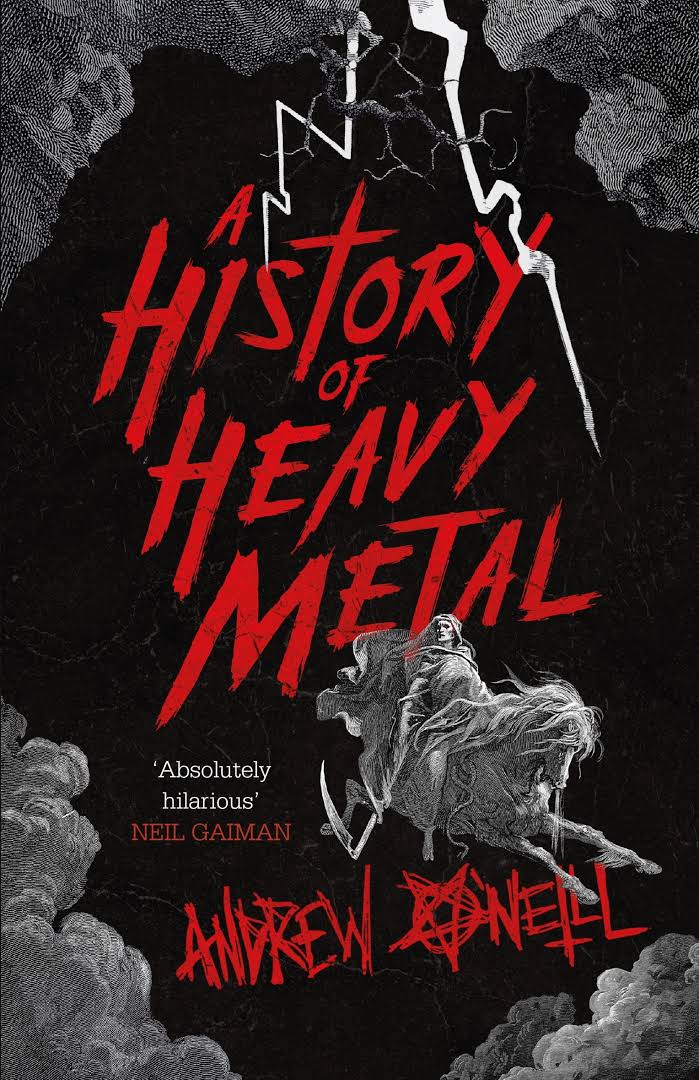A HISTORY OF HEAVY METAL” by ANDREW O'NEILL is a hilariously informative book, in which prejudices are presented as scientifically proven facts. It also proved to be a kind of sentimental journey. This hilariously informative book, in which prejudices and opinions are presented as scientifically proven facts, as they should be, and proved besides being indestructibly entertaining, a kind of sentimental journey. A History of Heavy Metal according to Andrew O'Neill touched on more than few occasions on my own journey through the musical landscape. The opening of Beethoven's Fifth was one of the first encounters with music I can recall. The Beatles were THE band of my youth. Helter Skelter was probably the first heavy metal song I heard, without me knowing what heavy metal was. Helter Skelter probably was the first heavy metal song, without Paul McCartney knowing what heavy metal was. He couldn't. The expression was coined by Lester Bangs after he heard Whole Lotta Love by Led Zeppelin (more than a year after Helter Skelter was released in 1968). But then Helter Skelter was perhaps punk. Years before the Ramones, Johnny Thunders & The New York Dolls came to be, light years before The Sex Pistols saw the light of day – so much for genres and their boundaries. (There is a strange thing about genres. Genres are invented to map the musical landscape. And then all music has an obligation to fit within a genre.) Genre boundaries are exactly what Andrew O'Neill does care about. Not always but when you want to prove (like he does) that heavy metal is the best music in the world, it's important to get your definition about what heavy metal is strict & straight. So Andrew O'Neill (never heard of him before by the way) begins to explain what is – according to him – definitely NOT heavy metal (any album that came out before Black Sabbath by Black Sabbath, Nickelback, your band) and what can be considered as heavy metal, even when it is not music (skulls, goat skulls, your mum). Andrew O'Neill is a comedian and it shows. But a comedian with some tricks on his sleeve. He works his way back to the origins of his favorite music genre and comes up with some informative (and funny) observations. (“Metal fans are better than the rest of the population and that's SCIENCE.” LOL! And something that's addressed directly to me: “It's entirely possible to love heavy metal while still dressing like a - whisper it - normal person. But why the fuck do you want to do that?” LMAO!) In search for the origins of heavy metal O'Neill reminds us of the heaviness of Howlin' Wolf. He makes a bit of fuzz about the difference between hard rock and heavy metal (like we care) but is a bit hazy about explaining it. (My shot: Hard rock is rock 'n roll on steriods and heavy metal is rock without the roll, expanded with some heavy chromatism.) He talks about extreme and heavy music and there are some observations I might add to his. About learning the subtle variations of something that sounds like mayhem when you first hear it. The fascination for music that takes you where you didn't go before. Music that's like looking at clouds while waiting for the moment until you start recognizing faces. The liberation and energy when those faces appear. (In this regard it’s interesting to look at the differences between a grunt and a melodic voice. The difference between, say, Obituary and Queensrÿche - with opera-derived vocals. The different vocal styles changes, or should change, the music more than just the sound of it. The primal power of the grunt, the lack of melody of it, finds in the best of black and death metal, its compensation in the instrumentation. I don’t believe in melodic grunt, it’s a bit the worst of different worlds: melody in poor sound with no faces in the clouds.) My fascination for extremism in music brought me from Slayer to Kurtag. My taste for melancholy brought me from heavy metal to Richard Wagner. Heaviness in music is not defined by volume. Musical heaviness is about the “downer”-effect it has on its listener (the kind of sorrow that feels good). Death (the band) on low volume is still heavy music. Morton Feldman's – totally not loud – Rothko Chapel is extremely heavy music. Play Sky Radio loud and it doesn't become heavy music (it becomes sound pollution). Heavy music is heavy music on all volume levels and decibels only go so far to communicate that heaviness. Decibels are limited to what ears can take. (Mind my tinnitus, the day Lemmy engraved a tattoo on my eardrums) Interesting and enteraining. And did I mention that The Neil Gaiman found it hilarious? A History of Heavy Metal - Andrew O'Neill (320 pages)
- Wouter de Moor
0 Comments
|
Archives
April 2021
BANDS & Musicians
All
|


 RSS Feed
RSS Feed